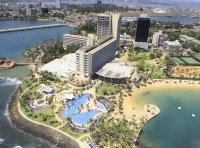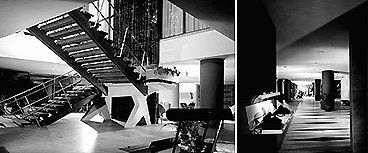 From an architecture designed to repel nomads, to one whose aim is to attract them...
From an architecture designed to repel nomads, to one whose aim is to attract them...I was staying last week in San Juan's Caribe Hilton. (I know, it's a tough job; but someone has to do it.) At first sight the Hilton is just another hotel like so many others. But in part precisely for that reason, it turns out that this is an important piece of Caribbean architecture, and of "tropical modernism."
According to Enrique Vivoni-Farage's "The Architecture of Power", the designs presented by US architects for this 1949 building were in Spanish Renaissance Revival style, in line with Conrad Hilton's own desires. But all three Puerto Rican submissions to the competition were in International Style, inspired rather by the Modern Movement.
As Periferia puts it, the values the winning design promoted were modernity and efficiency, over "the curious and the picturesque." This fit much better with the spirit of "Operation Bootstrap," the economic and political program by which Puerto Rico would be propelled into industrial modernity.

Apparently, the hotel's original bar was quite a striking example of postwar modernist styling. Now, after a recent extensive refit, its aesthetic is much blander, much less hard-edged. As James Russell observes, today the neighbouring Normandie, designed in 1939 Art Deco imitation of a cruise liner, has in fact the much more interesting interior.
Back at the Hilton, a touch of the exotic has been returned with the presence of two caged parrots in the lobby, opposite the check-in desk--though sometimes, it appears, these birds are allowed to sit on top of their cages, rather than simply within them.
Perhaps this is an emblem of the false freedom that Vivoni-Farage reads in the Hilton's modernism. He sees the choice of the International Style as an illusory decolonization, in which culture stands in for politics. The rejection of Spanish Renaissance style
gave the Puerto Ricans an illusion of "freedom" instead of truly liberating them from a colonial situation. Architecture served as a palliative, where the Modern was synonymous with freedom and the good life.By contrast, it is the opposite that is usually said of the rest of Latin America: that formal political independence in the 1820s has never really been backed by true cultural autonomy.
Meanwhile, and via The Morning News (full article here), some suitably modern guests of the Caribe Hilton, from 1959:

No comments:
Post a Comment